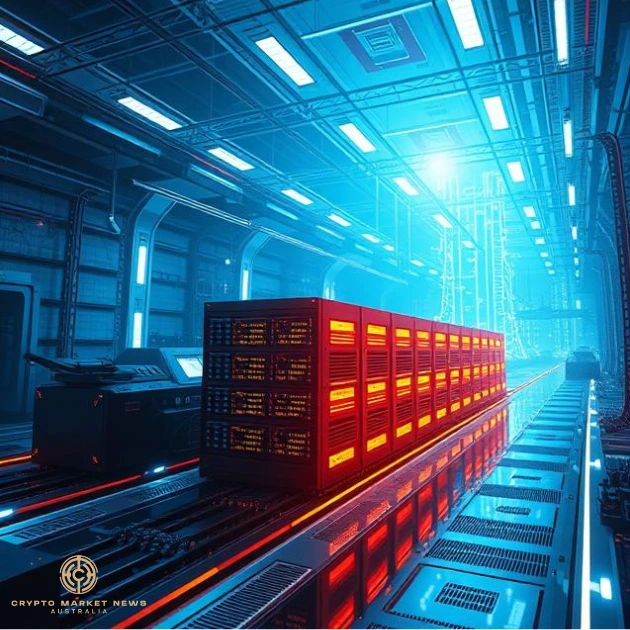Though other cryptocurrency technologies are a hot topic amidst crypto news, mining remains one of the prominent forms of creating new crypto tokens. Bitcoin mining, in particular, is a massive business, and there is now a new king of mining in Australia.
IREN Limited (IREN) recently became the leading Bitcoin mining company in Australia by hashrate. Based in Sydney, the firm recently surpassed MARA, its biggest rival, in terms of fleet utilisation and production.
Mining Competition Tight in July
The biggest news for IREN is its outperformance of rival MARA Holdings during the month of July. IREN became the industry leader in Bitcoin mining when it comes to production and hashrate efficiency for July.
During the month, IREN managed to mine 728 BTC. In comparison, MARA managed 703 BTC. This is even more impressive when you consider that IREN has a much smaller average hashrate (45.4 EH/s) compared to MARA (58.9 EH/s).
Perhaps the biggest difference came in the form of IREN’s operational capacity. More than 90% of its mining fleet was actively mining Bitcoin during July. Compared to less than 75% for MARA, it becomes easier to understand the shift. IREN was able to convert its hashrate far more efficiently into mined Bitcoin, even as energy requirements and mining difficulty trended upward.
Boosting Investor Confidence
In addition to its record production, IREN managed to post more than US$86 million in revenue for July. It also managed to bring in US$2.3 million from its artificial intelligence cloud services, a growing entity in its own right. Moreover, the company is moving into other areas, including acquiring 2,400 NVIDIA Blackwell GPUs, with almost 300 units already having been delivered.
With all this good news, investors are showing renewed confidence in IREN. Its share price shot up 11.4% to US$18.32 per share. Overall, this elevated the company’s market capitalisation to just over US$4 billion. In terms of publicly traded Bitcoin miners, IREN still trails rival MARA.
Additionally, MARA has a much larger Bitcoin treasury. Currently, the MARA Bitcoin treasury has 50,639 BTC holding a value of US$5.8 billion.
For IREN, this has to be a major victory. Consider that just one year ago, Cupler Research called IREN “wildly overvalued.” Since April 2024, IREN has increased its share price by an incredible 227%, rebounding from an all-time low of US$5.59.
Expanding into AI Services
As mentioned previously, IREN managed to generate an additional $2.3 million in revenue through its artificial intelligence cloud business. This is indicative of a greater initiative by the company to diversify beyond its bread and butter of Bitcoin mining.
Also mentioned is the purchase of 2,400 Nvidia Blackwell GPUs at the beginning of July as part of its expansion into AI operations. IREN has already received delivery of 256 units, and demand for those services only continues to grow.
Daniel Roberts, co-founder and co-CEO of IREN, sees “accelerating interest” of the company in GPU offerings. Having the ability to run dual rigs featuring GPUs like these shows the adaptability of the current IREN infrastructure.
The Challenges of Mining Bitcoin
Though mining Bitcoin remains a lucrative endeavour, it isn’t without challenges. Below are the most impactful and significant challenges facing Bitcoin miners currently.
Energy Consumption
Perhaps the biggest blockade when it comes to Bitcoin mining is that it is so energy intensive. This is mostly because of the proof-of-work system that Bitcoin mining uses. This demands a substantial amount of computational power, which means tonnes of energy usage in the process.
Because of these high energy demands, there is a greater carbon footprint left behind. Considering the reliance on fossil fuel-based energy sources, the emissions and carbon footprint that come as a result are quite considerable. There is also the electronic waste given the need to constantly upgrade and replace mining equipment, which only adds to the growing list of environmental concerns.
High Entry Costs
Another substantial barrier for entry involves the high startup costs. Hardware is specialised (think ASICs) and required to be efficient when it comes to mining. The problem is that rigs like these can be tens of thousands of dollars, presenting serious cost restrictions.
There is greater difficulty in mining as well. The more miners that join a network, the more difficult it is to solve the necessary mathematical puzzles required to earn rewards. Halving events, which see Bitcoin blocks halved every four years, make profitability for miners even tougher.
There are also electricity costs to consider. Depending on where a miner is located, costs may be even higher than average. The competition is also fierce, especially among large-scale industrial mining operations. Smaller miners have a hard time competing within the space and achieving profitability.
Regulatory Concerns
The entire cryptocurrency landscape is one that changes all the time. With shifting regulatory requirements, especially for global crypto mining, there are some inherent challenges. For instance, some jurisdictions impose restrictions and sometimes even bans because of environmental and energy consumption concerns.
A good example is what’s happening in China. The country already banned Bitcoin mining, and a number of other countries are already looking into the same possibility, making the mining landscape even more uncertain.
Other Issues
The concerns and potential issues don’t stop there for Bitcoin miners. Mining is very technologically complex, which means that having pre-existing knowledge of the hardware, software, etc., is a must.
Market volatility is a constant concern when it comes to crypto. Even the most stable coins face significant downswings, making them one of the most volatile assets. As the price of a token like Bitcoin shifts, it directly impacts the profitability of Bitcoin mining operations.
The need to remain current with mining hardware is a serious challenge as well. Remember, these setups can be quite expensive. Mining hardware regularly breaks or becomes obsolete, requiring replacements and repairs. This further adds to the inherent operational risks of running a Bitcoin mining operation.
Security remains a challenge as well. Miners are particularly susceptible to malware, hacking, and a litany of other cyberattacks that target their wallets, equipment, or both. This can lead to major theft of data or rewards, which can be costly in more ways than one.
Finally, there is the potential for scams. The lure of Bitcoin mining is profits, which brings scammers out left and right. Fake exchanges, wallets, and mining platforms become common issues to contend with as a result.
The Need Remains
For now, the need to mine Bitcoin and other major cryptocurrencies remains. Some have made the shift to more energy-efficient methods, while others focus on reducing the potential barriers. Whatever the case may be, mining is still here and likely will be for some time.
Long-term, however, the future is uncertain. Major platforms like Bitcoin and Ethereum are already making changes to their core technology in order to improve efficiency and speed and reduce transaction costs. Doing the same to make mining more accessible could come sooner rather than later.

